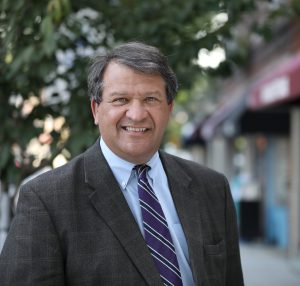Westchester Forms Task Force to Help Businesses Reopen

Westchester County named more than two dozen people affiliated in a wide range of services and industries to a newly-constituted Reopening Task Force on Monday hoping to help businesses successfully transition back into operation.
Led by County Legislator Catherine Parker (D-Rye) and restaurateur Lou Lanza, who are the task force’s co-chairs, its purpose is to help re-energize commerce safely and assist business owners wade through guidelines that will have to followed, said County Executive George Latimer.
“We have to open this society economically, we have to do it in a way that does not add to the contagion and the danger that people may have from this virus, second wave, what’s ever coming next, and we have to do it in a cooperative and inclusive way, and by God, we will do that,” Latimer said.
Representatives from nearly every sector will be involved, including business groups, nonprofit organizations, healthcare, the arts, construction, labor, real estate, clergy and other areas.
Parker, a small business owner in her home community for 23 years, said the task force will seek to work as a unifying voice.
“I think that this is going to be a way to get Westchester back where we were and probably even better than before because we do know that certainly some aspects of small business in this county have been struggling for many, many years,” Parker said. “Maybe we could actually take a look at the issue and come up with some things that give us a sustainable path forward.”
Last Tuesday, Westchester and Putnam, part of the seven-county Mid-Hudson region, entered Phase 1 of a four-phase reopening. Phase 1 includes the limited reopening of construction, manufacturing and curbside retail. Provided the metrics tracking testing, infection rates, COVID-19-related hospitalizations and deaths remain within the state-developed thresholds, the region would be able to advance to Phase 2 on or about June 9.
Five of the state’s 10 regions have already moved on to Phase 2 and two others, Western New York, which includes Buffalo, and the Capital region, which takes in Albany, are on course to move on this week.
Latimer said he was confident that the local region will do well, although Phase 2, which includes all retail, professional offices and restaurants, will likely be a more significant challenge.
He noted that the metrics in Westchester, the largest of the seven counties, continue to trend in the right direction. Active cases have fallen to 1,229 from nearly 12,000 in early April while COVID-19-related hospitalizations are in the mid-200s.
“I think we do this opening and we can do it effectively and well,” Latimer said. “We’re also monitoring what’s happening in upstate.”
Lanza, who owns multiple restaurants throughout the county, said the key to continuing to progress through the reopening phases will be for the task force and merchants to work creatively to come up with unconventional solutions. For example, if a municipality closes down a street to vehicular traffic to promote social distancing, and there are restaurants on that street, perhaps there can be outdoor dining, he said.
“I think we can do it safely, that’s the main thing, so whatever guidelines we have, it’s going to be up to the restaurateurs to manage their own staff, take care of the customers, but there are safe ways to do it, especially outdoor cafes,” Lanza said.
Even though restaurants are part of Phase 3, he urged his fellow restaurant owners to start preparing. Unless there is regression in the metrics, there will be about two weeks between the phases.
Board of Legislators Chairman Ben Boykin (D-White Plains), who recommended to Latimer to appoint Parker as a task force co-chair because of her experience in business and government, said the group needs to help small businesses, which is an economic engine.
“This is going to be a very important challenge because we’re in a place where we’ve never been before,” Boykin said. “We’re onepause, we closed the economy down and now we’ve got to open it in a more vibrant and in a smarter way so that the businesses can survive, grow and move to the next level.”
Despite the progress made in controlling the spread, Latimer urged the public to continue to be vigilant.
“No one can be sure what this virus can do next,” he said. “So there’s a certain degree of humbleness here, but the trend line shows a continuing management of it and we think we can do it.”

Martin has more than 30 years experience covering local news in Westchester and Putnam counties, including a frequent focus on zoning and planning issues. He has been editor-in-chief of The Examiner since its inception in 2007. Read more from Martin’s editor-author bio here. Read Martin’s archived work here: https://www.theexaminernews.com/author/martin-wilbur2007/
